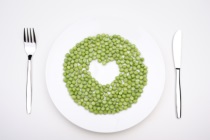According to 'Eat right by your blood type', there are some people whose bodies prefer a semi-vegetarian lifestyle. The theory is based on people's different blood types evolving from different ancestral heritages, lands and climates. For instance, those stemming from Celtic stock are prone to certain diseases, some of them food-related like gluten intolerant coeliac disease.
It also means that a higher numbers of people than average are likely to carry the 'fat' gene, a gene that predisposes your body to store fat rather than burn it. The fat gene was a great asset historically in a cold climate, but not so much now with less arduous lifestyles and modern heating.
We all know people who live on meat and carbs and don't tend to like much else, and others who find eating a lot of meat leaves them feeling heavy, slow and tired opting instead for a vegetarian lifestyle.
What is the difference between being a vegetarian and a vegan?
Strictly speaking, a vegetarian foregoes all animal flesh including red meat, fish and chicken, rabbit, venison, pork and shellfish. While some people come to it through choice, others choose it through religious or ethical beliefs or as a result of allergies or diseases and the desire to limit or control their symptoms.
 Vegan options are also finding their way into cafes and supermarkets. Vegans forego not just flesh, but all animal products including cheese, gelatin, rennet, milk, eggs, dairy, beeswax and honey.
Vegan options are also finding their way into cafes and supermarkets. Vegans forego not just flesh, but all animal products including cheese, gelatin, rennet, milk, eggs, dairy, beeswax and honey.
Raw Food?
The Raw Food Diet (long espoused by Madonna and Gwyneth Paltrow) consisting of uncooked, unprocessed, and often organic foods or wild foods is also coming more into the mainstream.
Wikipedia explains that "depending on the type of lifestyle and results desired, raw food diets may include a selection of raw fruits, vegetables, nuts, seeds (including sprouted whole grains such as gaba rice), eggs, fish (such as sashimi), meat (such as carpaccio), and non-pasteurized/non-homogenized dairy products (such as raw milk, raw milk cheese, and raw milk yogurt)."
Vegetarian diet: research finds more in favour and little against
Back in time, concerns about sufficient levels of vitamins like B12, and iron were always covered in articles on the pro's and con's of being vegetarian. More recently, concerns have been raised about getting sufficient omega-3 fatty acids or calcium if you are vegan. These days however, scientific research and opinion has shifted from concern about deficient nutrition to the health benefits of a vegetarian lifestyle on the back of large scale, long term studies.
The biggest one covers 20 years and was undertaken by Cornell University, the University of Oxford, and the government of China. Called 'The China-Cornell-Oxford Project', it has established a correlation between the consumption of animal products and a variety of chronic illnesses, such as coronary heart disease, diabetes, and cancers of the breast, prostate and bowel.









Join the Discussion
Type out your comment here:
You must be logged in to post a comment.